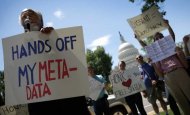Can Americans sue over NSA surveillance?
By Peter Weber | The Week – Tue, Jul 16, 2013
Since the George W. Bush administration's warrantless domestic wiretapping program was uncovered in 2005, some 70 lawsuits have been filed
in federal court to challenge the government's broad collection of
Americans' telephone and internet data. Nearly all of them have been
dismissed, in part because the plaintiffs couldn't show they were
targeted by the top-secret programs.
Former National Security Agency
contractor Edward Snowden's leaks may have changed that, according to
legal scholars and civil libertarians. At least five new lawsuits have
been filed since he first revealed in June that the NSA indiscriminately collects and stores some telephone metadata of U.S. citizens.
SEE ALSO: 11 things that are banned in other countries but legal in the U.S.
The "one critical difference from the Bush era," American University national security law expert Stephen Vladeck tells The Washington Post,
is that "we now have indisputable physical evidence that the conduct
being challenged is actually taking place." That makes it "more likely"
that courts will start allowing legal challenges to surveillance practices, Vladeck adds.
On June 8 in San Francisco, U.S. District Judge Jeffrey White took a first big step toward allowing the laws to be challenged on Fourth Amendment grounds. White ruled that a 2008 lawsuit, Jewel v. NSA, filed by the Electronic Frontier Foundation against NSA "dragnet" phone-data collection, didn't fit under the Obama administration's invocation of "state secrets" privileges, in part because of "the multiple public disclosures of information regarding the surveillance program." The EFF's Kurt Opsahl was ebullient:
CNET's Declan McCullagh is a little more measured, noting that White's ruling "is anything but a final decision." But, he adds,
"overcoming the hurdle of the administration's 'state secrets' claims
is still a major step," and one that allows the case to continue.
On Monday, another little beam of transparency shone through, as the
chief judge of the secretive Foreign Intelligence Surveillance Court —
charged with overseeing the NSA surveillance, and accused of being a
rubber stamp — urged
the Obama administration to declassify its ruling that allegedly
compelled Yahoo and other internet providers to turn over customer data.
That's a win for Yahoo, which wants to prove it fought on behalf of its
users, but also a potential window into the FISA court's legal
rationale for allowing metadata collection.SEE ALSO: Will the George Zimmerman case teach Americans to mind their own business?
What's more, says The Washington Post's Carol D. Leonnig, FISA court Judge Reggie B. Walton's "order was released on a public docket the court recently created after revelations about National Security Agency programs." That itself is a big step for the reticent "spy court, which hears arguments in sealed, windowless courtrooms and has treated all its opinions as classified secrets."
In practice, though, Americans still face the same hurdle to challenging the surveillance laws — specifically the 2008 expansion of FISA court oversight — in federal court, says Adam Liptak in The New York Times. In February, the Supreme Court sided 5-4 with U.S. Solicitor General Donald Verrilli Jr. and rejected a challenge to the 2008 law from Amnesty International. They relied, says Liptak, on a commitment from Verrilli:
He said, a little comically in retrospect,
that the human rights groups, lawyers and reporters who sought to
challenge the law had no particular reason to think that their
communications were being collected.... If the government wants to use
information gathered under the surveillance program in a criminal
prosecution, he said, the source of the information would have to be
disclosed. The subjects of such surveillance, he continued, would have
standing to challenge the program. [New York Times]
Since the Supreme Court ruling, however, federal prosecutors in Miami
and Chicago have refused to say if the 2008 law was used to target
defendants accused of plotting to blow up targets in New York and
Chicago, respectively. In effect, and contrary to Verrilli's assurances,
Liptak says,
these prosecutors "have immunized the surveillance program from
challenges under the Fourth Amendment, which bans unreasonable searches
and seizure."SEE ALSO: 5 things that make you irresistible to mosquitoesEven if all the challenges to NSA surveillance end up being thrown out, says The Washington Post's Jerry Markon, "the lawsuits could still serve a larger purpose for opponents of the programs by raising public awareness of the issues surrounding surveillance and possibly forcing the government to make changes or disclose more." Previous lawsuits have led to changes at the U.S. prison camp at Cuba's Guantanamo Bay and a public acknowledgment of the U.S. drone program.
Whoever is president, "the government does things to avoid embarrassment," University of Pittsburgh law professor Jules Lobel tells The Washington Post. "And lawsuits are a key pressure point."




No comments:
Post a Comment